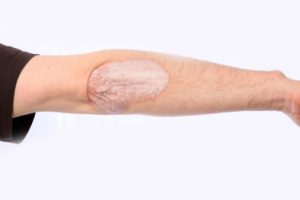
Psoriasis is a common skin disorder that affects the life cycle of skin cells. It results in cells building up rapidly on the surface, giving it the appearance of being thick, having silvery scales, and being excessively dry with red patches. It can also cause agonizing pain to those affected. Psoriasis is considered a chronic autoimmune disorder, which means the body’s own immune system is attacking itself, and in this case, it’s attacking the skin cells. There are many different types of psoriasis, and here is a list of some of the more common ones:
- Plaque psoriasis: The most common type, presenting as dry, raised red skin lesions (plaques) covered with silvery scales. These plaques can cause intense itching that may become painful over time. Plaques can occur anywhere on the body, including the genitals and even the soft tissue inside the mouth.
- Nail psoriasis: This type affects the nails of both the hands and feet, causing pitting, abnormal growth, and discoloration. Damage can become so severe that nails may start to crumble or even separate from the nail bed altogether (onycholysis).
- Scalp psoriasis: As the name suggests, this type primarily affects the skin on the scalp. This typically looks like silvery plaques can be seen that extend beyond the hairline.
- Psoriatic arthritis: If the thick scaly skin isn’t bad enough, imagine have inflammation in your joints as well. This type causes the same scaly plaques with pitted and discolored nails but is combined with painful joints. Symptoms range from minor to severe but are usually not as crippling as other forms of arthritis.
Researchers compiled and reviewed data from more than 5,400 people in Sweden with the common skin disease and found that women had a significantly lower rate of severe psoriasis than men. This finding held true for all age groups and for all parts of the body, with the exception of the head.
“The discovery that men’s psoriasis is often more serious helps explain a gender gap, with more men than women seeking psoriasis treatment,” said study senior author Marcus Schmitt-Egenolf, a researcher at Umea University’s Department of Public Health and Clinical Medicine.
This additional information on one of the most common skin disorders that plague men and women can help with management of severe psoriasis and its comorbidities.
Related: Home remedies to soothe your psoriasis